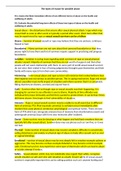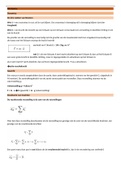18th October 2016 – Contracts lecture
Consideration, Estoppel and Intention
Enforcing promises
The law of contract determines what legal consequences follow from the making of promises
and agreements
No legal system enforces every promise, so each must identify which promises / agreements are
legally binding and which are not
We’ll be looking at what promises English law enforces and why
Requirements of form
A legal system may grant the ‘badge of enforceability’ only to those agreements which are
entered into a certain form. For example, a lease more than three years must be by deed.
Compliance with this requirement is relatively straightforward:
o There must be a document bearing the word ‘deed’, or having some other indication
clearly on its face that it is intended to take effect as a deed
o It must be signed by the individual maker of the deed
o That signature must be attested by one witness if the deed is signed by the maker
o It must be delivered – there must be some conduct on the part of the person executing
the deed to show that he intends to be bound by law
Freedom of contract
The answer many legal systems give is that the law will enforce those promises / agreements
which the parties intend to be legally enforceable
This reflects the idea of freedom of contract and the respect for choice which lies behind it: if
you want your promise to be legally binding, the law will treat is as binding; if you don’t, it won’t
But not, it seems, English common law
Consideration
Instead the courts held that promises would not be enforceable unless they were supported by
consideration
Two flawed definitions
Consideration = a reason for enforcing a promise (Atiyah)
‘A valuable consideration, in the sense of the law, may consist either in some right, interest,
profit or benefit accruing to the one party, or some forbearance, detriment, loss or
responsibility, given, suffered or undertaken by the other’ (Lush J in Currie v Misa)
Consideration defined
The usual interpretation of consideration is that it is based upon the idea of ‘reciprocity’; that a
promise should not be able to enforce a promise unless he has given or promised to give
something in exchange for the promise or unless the promisor has obtained (or been promised)
something in return.
Consideration and motive
, Thomas v Thomas
A testator, shortly before he died expressed the desire that the widow should have the house for
the rest of her life. After his death, the executors promised to carry out the testator’s desire
provided that the widow paid £1 per annum towards the ground rent and kept the house on
repair. Although the testator’s desire was the motive for the transaction, that desire was not the
consideration, rather the consideration was the widow’s promise to pay £1 and to keep the
house in good repair. It was only the latter which was of value in the law.
The scope of the doctrine
The first rule is that consideration must be sufficient but it need not be adequate
The second is that past consideration is not good consideration
The third is that consideration must move from the promisee
Consideration and exchange
Better: consideration = exchange
There is consideration when the promisor gets something in return for his promise: I
promise X if you promise/do Y
Each promise—the purchaser’s promise to pay, the bookseller’s promise to deliver the book
—is supported by consideration, since it is made in return for the other
Where no consideration is given, it is a bare or gratuitous promise
Combe v Combe
Mr and Mrs Combe were getting divorced. Mr Combe promised to pay Mrs Combe £100 a year
following the divorce. When the divorce was finalised, Mrs Combe didn’t apply to the Divorce
Court for maintenance from Mr Combe. Mr Combe didn’t pay the money he promised. Mrs
Combe sued, claiming, inter alia, that her forbearance from claiming maintenance was
consideration for Mr Combe’s promise
Held: there was no consideration—though Mrs Combe’s not seeking maintenance was a benefit
to Mr Combe and a detriment to Mrs Combe, Mr Combe had not requested this in return for his
promise
Shadwell v Shadwell
Charles Shadwell, hearing that his nephew, Lancelot, had got engaged, wrote to him to say that
he’d pay him £150 a year, until Lancelot’s income as a Chancery barrister reached 600 guineas.
Lancelot’s income never got that high. After a number of years Charles stopped paying.
Lancelot sued
Held (by majority): the promise was enforceable as the promise was made with the implied
request that Charles go ahead with the marriage.
Adequacy of consideration
So long as there is an exchange, the court doesn’t ask whether what was exchanged was of
equal value
This rule is typically expressed, a little unhelpfully, by saying that consideration must be
sufficient but needn’t be adequate—or, more accurately, so long as you get something in
return for your promise, it doesn’t matter what/how much
Chappell v Nestlé













